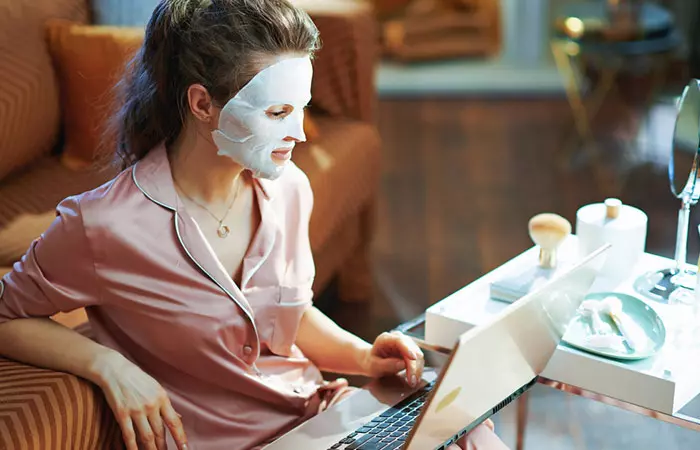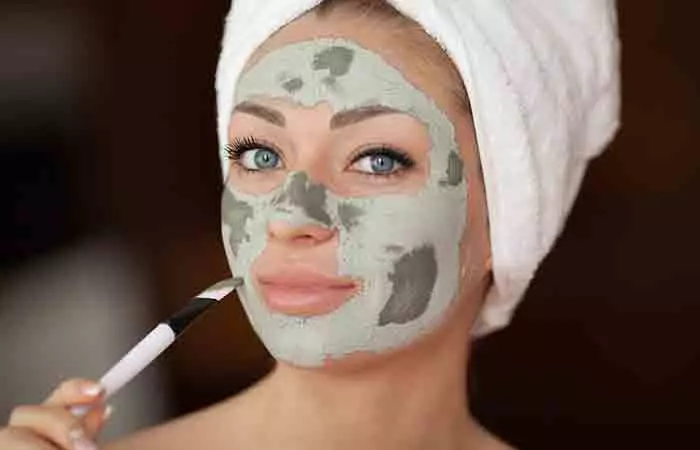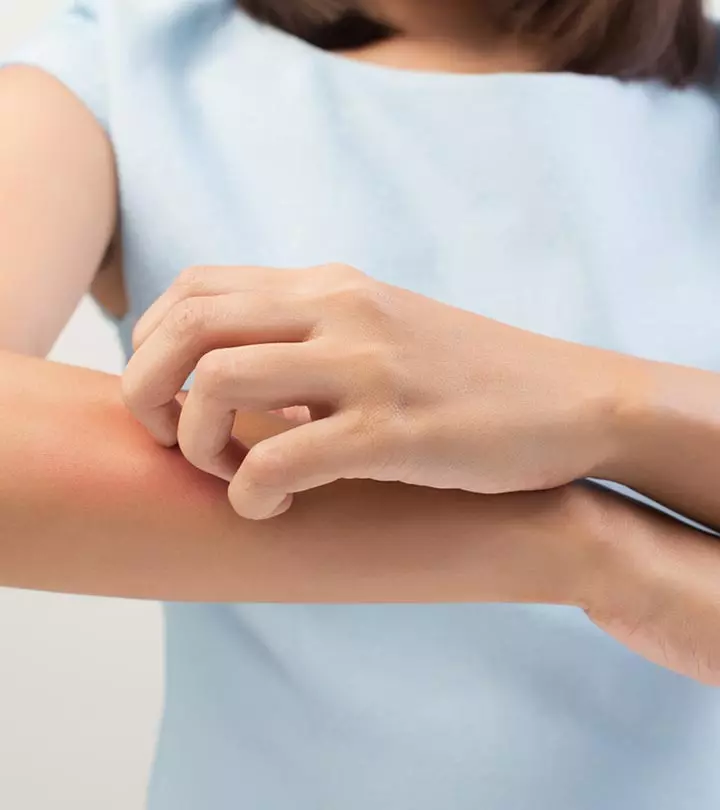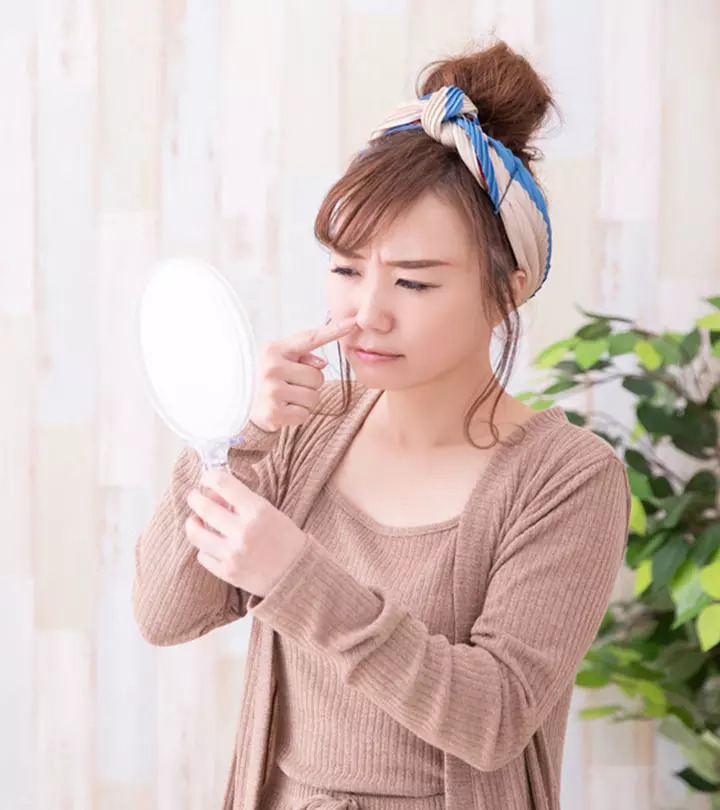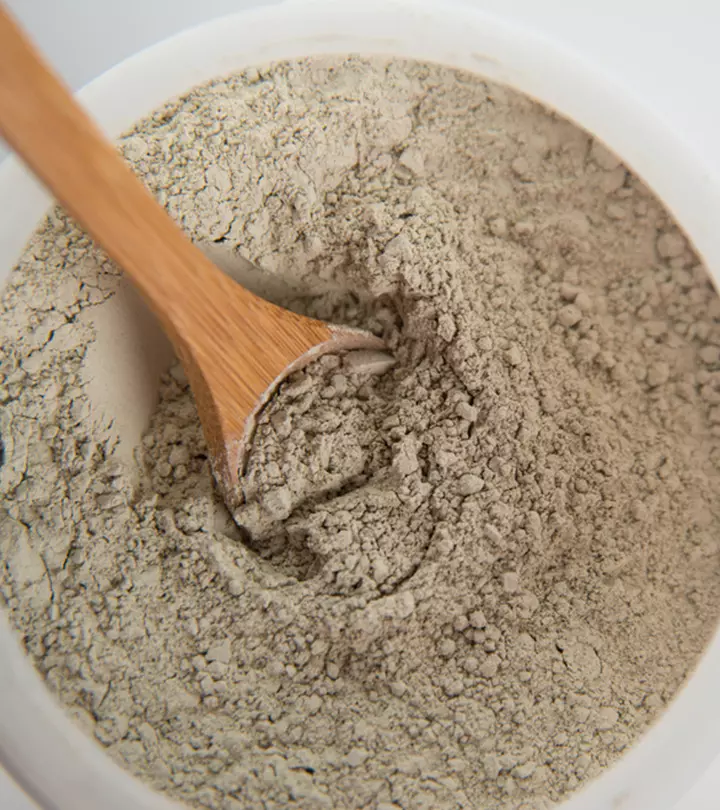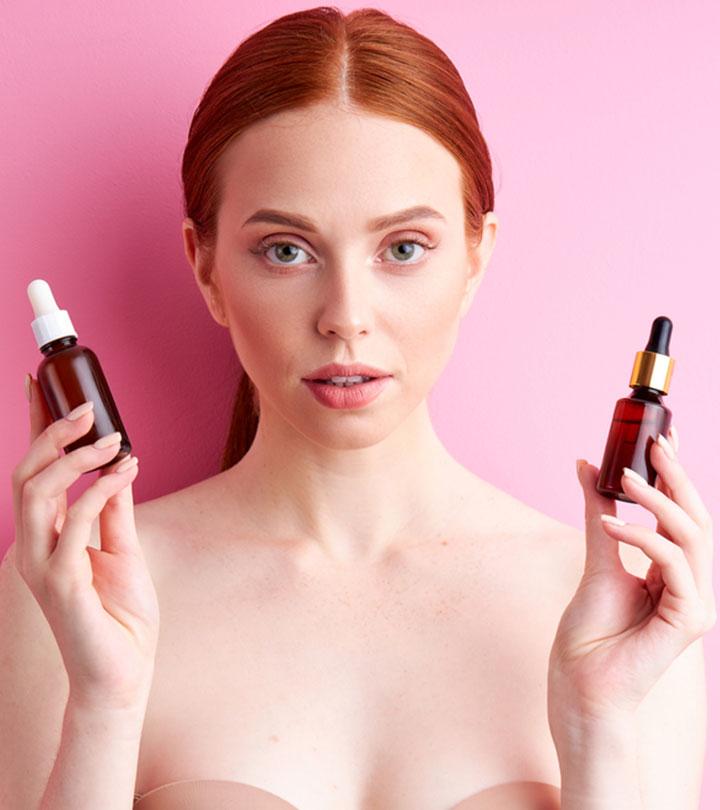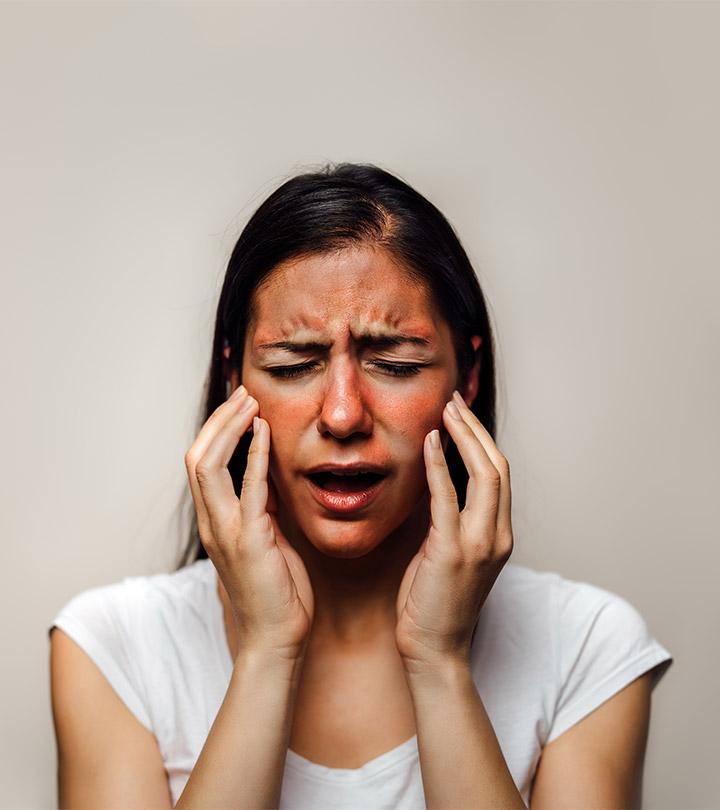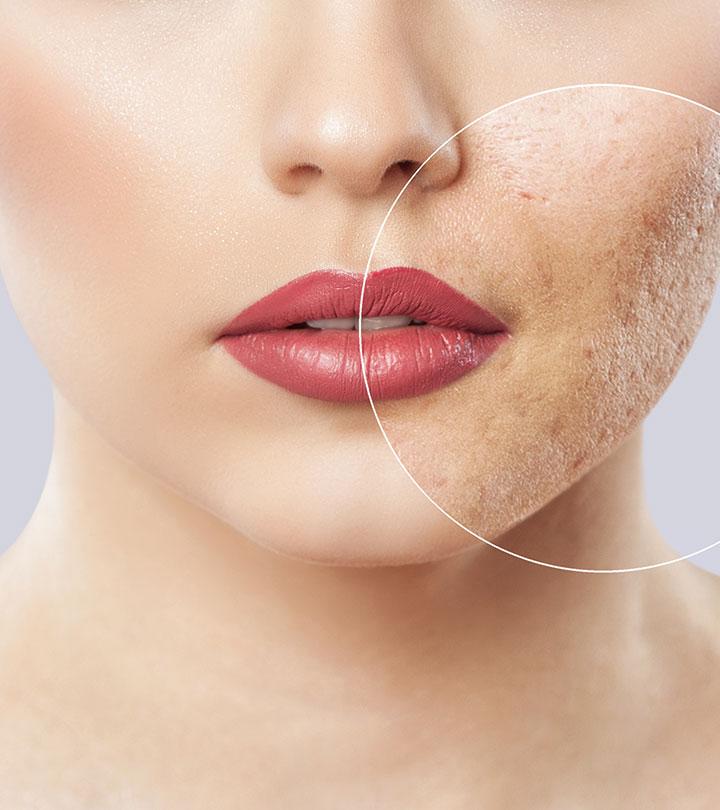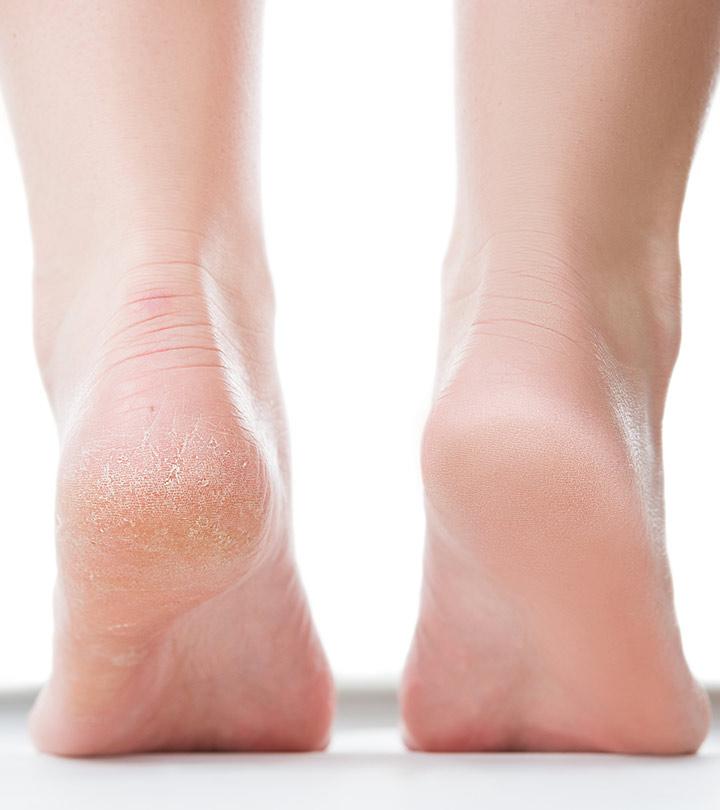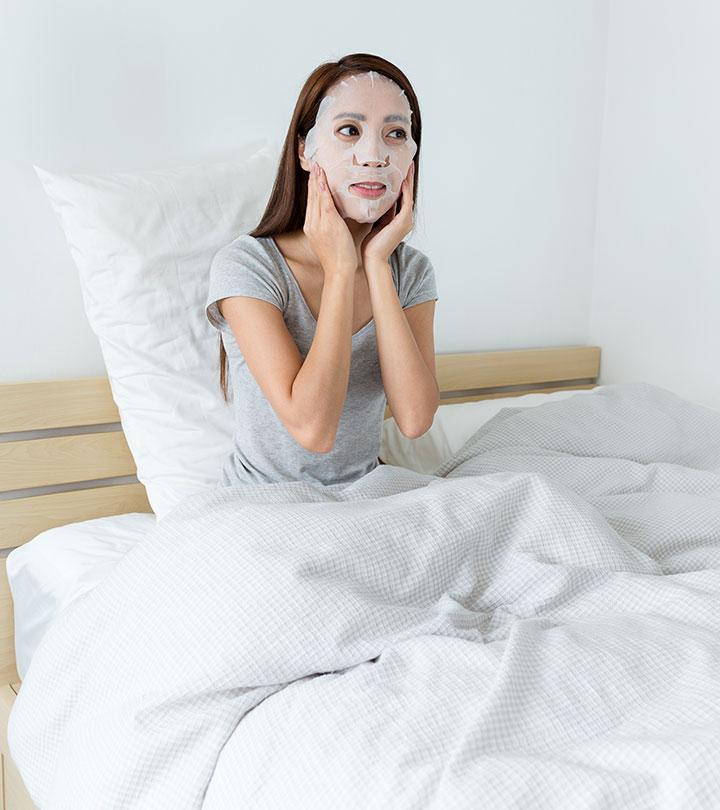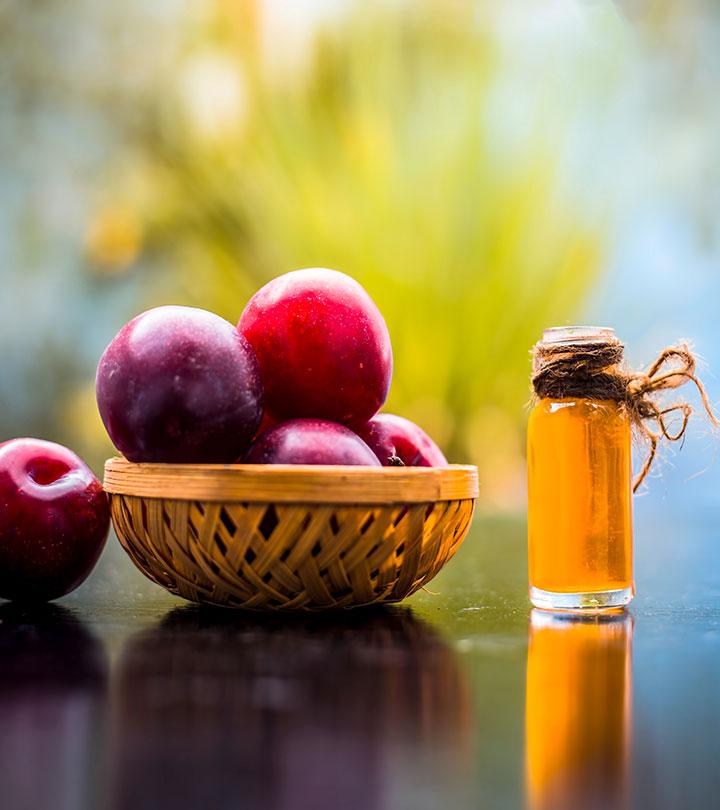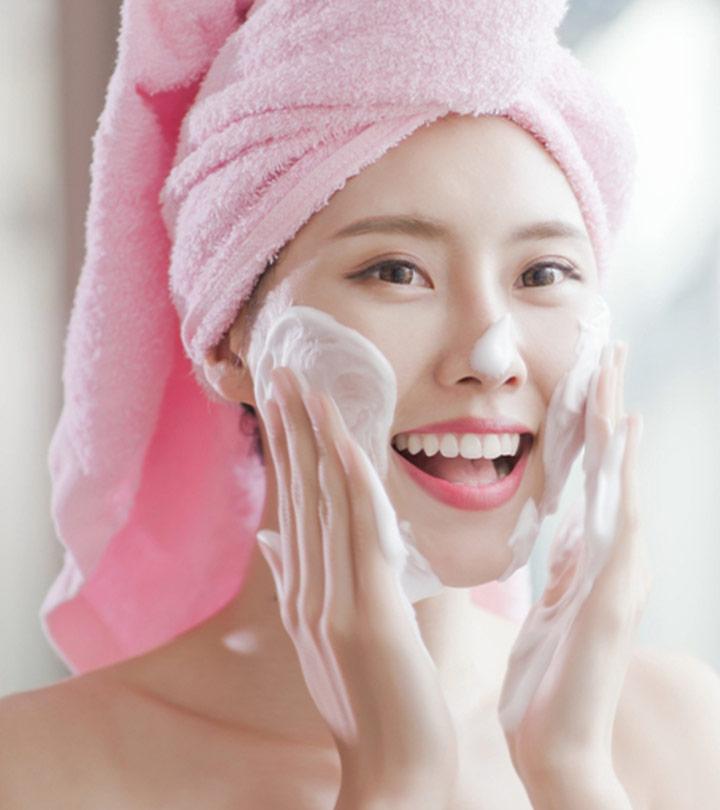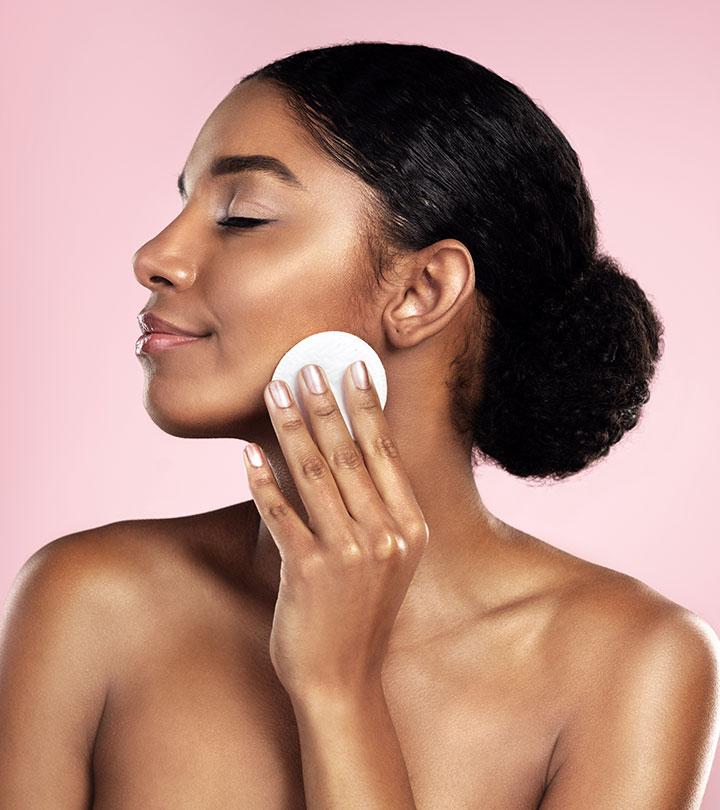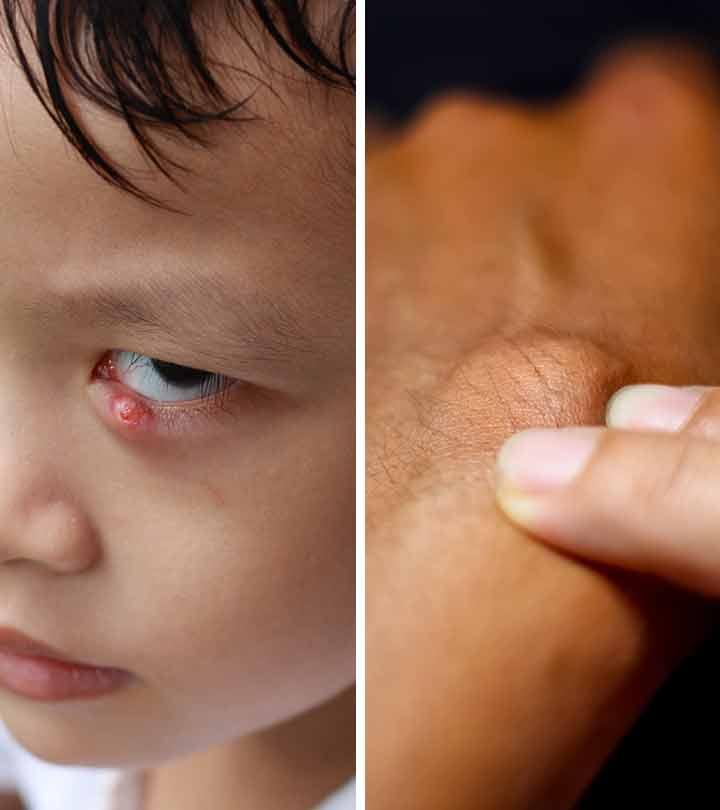What Causes Shiny Skin? How To Deal With It
If a natural sheen on your skin causes more concern than joy, learn what it could mean.

Image: Shutterstock
Who does not want glossy, shiny skin? But, is shiny skin actually healthy? While those shiny streaks on your nose tip and cheekbones may act as a natural highlighter, enhancing your facial attributes with layers of grease on your face can be a problem.
Shiny skin is common when you have hyperactive sebaceous glands, which can be caused by various factors, such as puberty, genetics, hormonal imbalance, or climatic conditions. Fortunately, you can manage your shiny skin. Keep reading to discover the solutions!
In This Article
Shiny Skin: Is It Healthy Or A Cause For Concern?
Your sebaceous glands release sebum or natural oils that give your skin a healthy shine. Usually, shiny skin is not a cause for concern. The natural oils contain essential fat, triglycerides, ceramides, and wax that form a layer on your skin to protect its natural barrier and keep it moisturized (1). They protect the skin from harmful bacteria, UV damage, and inflammation to keep it healthy.
In other words, luminous skin can be a sign of healthy skin. However, excess oil on your skin can lead to problems like acne breakouts. Conversely, if your skin loses its shine and appears dull, it is a cause for concern as this can lead to skin dryness and crepiness.
Although many women desire shiny and glowing skin, the excess shine can be annoying. If your skin turns oily and shiny after a few hours of cleansing, it means you have overactive sebaceous glands. This is common in people with oily skin, and multiple factors may cause excessive sebum production. Let’s take a look.
Causes Of Shiny Skin
1. You Have Oily Skin
If you have oily skin, it is obvious that your skin will produce more sebum than other skin types. Most of the time, those with oily skin have shine and grease around their T-zone. Enlarged pores around this area may also cause excess sebum production.
2. Excessive Sweating
Other than sebum, the skin also secretes sweat, which, together with the sebum, may make your skin appear shiny and dewy.
3. Environmental Factors
Hot and humid weather can also cause excess sebum production, giving you shiny skin. If you have oily and combination skin, you may get shiny skin during summers.
4. Wrong Skin Care And Makeup Products
Using the wrong skin care products may also cause excessively shiny skin. For instance, if you have oily skin and use a heavy cream containing plant or petrolatum-based oils, your skin may appear shiny. Similarly, using a cream-based or liquid foundation may also make your skin appear shiny.
5. Excessive Cleansing And Exfoliation
You may feel tempted to wash your oily skin multiple times a day to keep the shine away. However, you do not realize that overdoing this step is causing excess oil production. When you cleanse too much, your skin feels the need to moisturize itself and may increase the sebum production.
Similarly, excessive exfoliation can also trigger your skin to produce excess oil to cover up the moisture loss. On the other hand, not cleansing can lead to clogged skin pores, causing breakouts and shiny skin.
Moderation is the key to maintaining a balance. Here are some ways to strike a balance and prevent your skin from getting shiny.
How To Reduce The Shine: Is It Possible To Prevent Shiny Skin?
1. Use A Proper Cleanser
Wash your face with a mild cleanser that contains salicylic acid (a BHA). Never wash your face more than twice a day. Avoid using facial soap bars and wet wipes that contain alcohol. Salicylic acid helps break down the oil in the skin pores and prevents pore clogging without making the skin excessively dry.
2. Exfoliate Once A Week
It is because excessive exfoliation can trigger the skin to produce more sebum. It may also irritate your skin. Therefore, be careful not to overdo it. You may use an AHA and BHA-based chemical exfoliator or a physical exfoliator containing activated charcoal. These ingredients clear the excess oil from your pores and keep them clean, thus reducing oil production and shine and bestowing you with flawless skin in return.
3. Use Toners
Do not skip this step. Toners with ingredients like glycolic acid and lactic acid can help dry out the excess oil and reduce the shine. Moreover, they can help minimize the appearance of the pores and give a toned look to the skin.
4. Use Proper Makeup Products
If you are trying to mattify your skin, go for oil-free primers that have shine-control or oil-absorbing properties. Apply them to the areas that produce excess oil, like the T-zone. If you have excessively oily skin, go light on foundations. They can feel heavy and prevent the skin from breathing. Instead, go for lightweight tinted moisturizers.
Keep a sebum-preventing powder handy. Use it for touch-ups and prevent shine. No-sebum powders have a mineral-based formula that absorbs excess oil and prevents shine for at least a few hours.
 Quick Tip
Quick Tip5. Use A Moisturizer
Wondering why use a moisturizer on oily skin? Well, when your skin is moisturized, your skin does not need to produce excess sebum to keep it hydrated and supple. So, for many, skipping moisturizers is a strict no-no and is a must if you want youthful-looking skin.
Use a lightweight, water-based moisturizer. You can use emulsions or gel-based products that contain hyaluronic acid, aloe vera, and green tea. Emulsions are water-based and are excellent for oily skin.
6. Wear Sunscreen
The trick is to find the right formula and consistency. Check for sheer sunscreens with an oil-free formula and micronized zinc oxide to absorb excess oil. Zinc in the formula can help prevent acne without causing shine or oiliness.
 Quick Tip
Quick Tip7. Use A Clay Mask
Once a week, treat your skin with a clay mask. Check for masks with bentonite clay, Fuller’s earth, and kaolin clay. They absorb the excess oil from your skin and exfoliate it to keep it bright and radiant.
8. Use Mattifying Setting Spray
Mattifying setting sprays are your best friends and keep away the shine for longer. Make sure to use it the right way – prep your skin, use your skin care products, and before you apply a primer and makeup, spritz the mattifying setting spray, and let it dry. These sprays lock in all the skin care ingredients and oil to work as a barrier between your skin care and makeup products.
9. Try The Coconut Setting Powder
Never heard of it? Well, this is a pale-looking powder that vanishes when applied to the skin. It removes surface oil to give you that shine-free look. However, resist your urge to apply it all over the face – limit it to shiny hotspots like your T-zone.
Key Takeaways
- Hyperactive sebaceous glands release natural oils that give skin a shine.
- But excessive cleansing and exfoliation can trigger the skin to produce more oils to compensate for the moisture loss.
- However, toners with ingredients like glycolic acid and lactic acid can reduce the shine.
Infographic: 5 Causes Of Shiny Skin + Tips To Prevent It
Excess shine on the face can make it feel greasy and may attract acne-causing bacteria. This can become more frequent if you have oily skin. But is there a solution? Well, yes. In the infographic below, we have listed the factors causing the excess shine on your skin and what you can do to possibly prevent it. Take a look. Illustration: StyleCraze Design Team
Shiny skin is not a cause for concern. However, it can get annoying if it is too shiny and difficult to manage, especially for oily skin people. Oiliness, excessive sweating, environmental factors, wrong skin care products, excessive cleaning, and exfoliation can cause shiny skin. But you can prevent this by following a few simple practices, like using a proper cleanser suitable for your skin, exfoliating once a week, wearing sunscreen, using setting powder, and many more. Follow these tips and use the right skin care products to solve this issue.
Frequently Asked Questions
Can diet affect the appearance of shiny skin?
Yes, your diet can affect the appearance of your skin. Dr. Anju Methil, MD specializing in dermatology and cosmetology, says, “Too much oily food creates a shiny complexion. A balanced diet with vitamins, antioxidants, and omega-3 fatty acids promotes natural glow.”
Is my skin shiny or glowing?
To differentiate between shiny and glowing skin, Dr. Archit Agarwal, a dermatologist, suggests some tips. He says, “Shiny skin feels greasy while glowing skin feels smooth and hydrated. Shiny skin has a wet-looking, slick surface while glowing skin has a more even, reflective luminosity. Enlarged pores are often associated with shiny skin, which is less noticeable on glowing skin.”
Are there different types of shiny skin?
Each skin type will exhibit different types of shine. Dry skin will have little to no shine, while combination skin will have a shiny t-zone. Even normal skin will show up with a slightly oily t-zone at the end of the day.
Are there any lifestyle factors that contribute to shiny skin?
Yes, a diet high in refined sugar, stress, disturbed sleep cycle, and hormonal fluctuations can cause an increase in sebum production and contribute to shiny skin.
Can certain medications or medical conditions cause shiny skin?
Yes, certain medical conditions like acne and PCOS (Polycystic Ovarian Syndrome) can affect the skin’s oil production and contribute to shiny and oily skin.
How do I determine if my shiny skin is due to excess oil or other factors?
Pay attention to when you develop shiny skin. Is it after exercising or due to stress/ If you are still unsure, consult a dermatologist to understand the underlying cause of your shiny skin. Dr. Anju Methil says, “After cleansing if skin quickly becomes shiny again, it’s likely due to oil.”
Can shiny skin be a sign of dehydration?
Yes, shiny skin can be a sign of dehydration. As the skin becomes dry and flaky, the body will produce more oil to compensate for the moisture loss, resulting in shiny skin.
Do you want to learn how to get rid of shiny skin? Check out this video for simple tips to keep your skin appearing matte and fresh throughout the day.
References
Articles on StyleCraze are backed by verified information from peer-reviewed and academic research papers, reputed organizations, research institutions, and medical associations to ensure accuracy and relevance. Read our editorial policy to learn more.
- Sebaceous gland lipids
https://www.ncbi.nlm.nih.gov/pmc/articles/PMC2835893/
Read full bio of Dr. Robert S. Bader
- Dr. Anju Methil, MD, DDV, is a cosmetologist and dermatologist with nine years of experience in the field. She specializes in injections and fillers for non-surgical facial contouring and has trained under top dermatologists and plastic surgeons across the world. Dr. Methil completed her postgraduation in Dermatology from DY Patil Hospital, Mumbai, and has received many awards for her contribution to cosmetic medicine.
 Dr. Anju Methil, MD, DDV, is a cosmetologist and dermatologist with nine years of experience in the field. She specializes in injections and fillers for non-surgical facial contouring and has trained under top dermatologists and plastic surgeons across the world. Dr. Methil completed her postgraduation in Dermatology from DY Patil Hospital, Mumbai, and has received many awards for her contribution to cosmetic medicine.
Dr. Anju Methil, MD, DDV, is a cosmetologist and dermatologist with nine years of experience in the field. She specializes in injections and fillers for non-surgical facial contouring and has trained under top dermatologists and plastic surgeons across the world. Dr. Methil completed her postgraduation in Dermatology from DY Patil Hospital, Mumbai, and has received many awards for her contribution to cosmetic medicine. - Dr. Archit Agarwal, MD, is a dermatologist with nine years of experience. He specializes in treating individuals with complex skin conditions and has authored several papers that have been published in high-impact medical journals. Dr. Agarwal earned his medical degree from the Hassan Institute of Medical Sciences, Rajiv Gandhi University of Health Sciences, Karnataka, and a Fellowship in Aesthetic Medicine from the University of Greifswald in Germany.
 Dr. Archit Agarwal, MD, is a dermatologist with nine years of experience. He specializes in treating individuals with complex skin conditions and has authored several papers that have been published in high-impact medical journals. Dr. Agarwal earned his medical degree from the Hassan Institute of Medical Sciences, Rajiv Gandhi University of Health Sciences, Karnataka, and a Fellowship in Aesthetic Medicine from the University of Greifswald in Germany.
Dr. Archit Agarwal, MD, is a dermatologist with nine years of experience. He specializes in treating individuals with complex skin conditions and has authored several papers that have been published in high-impact medical journals. Dr. Agarwal earned his medical degree from the Hassan Institute of Medical Sciences, Rajiv Gandhi University of Health Sciences, Karnataka, and a Fellowship in Aesthetic Medicine from the University of Greifswald in Germany.
Read full bio of Eshna Das
Read full bio of Shiboli Chakraborti







